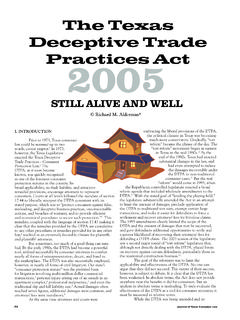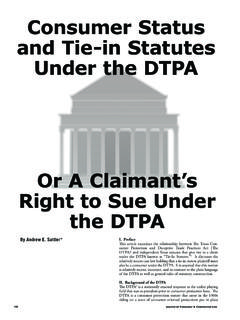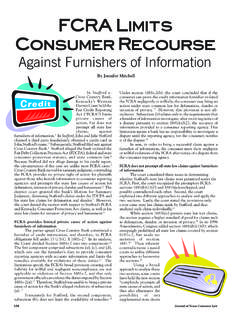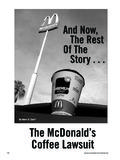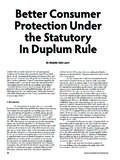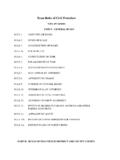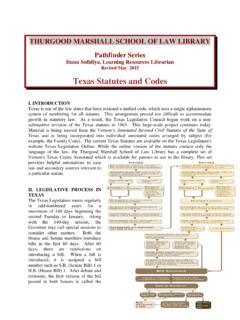Transcription of Fee Shifting Texas - Journal of Consumer & …
1 Journal of Texas Consumer Law36 TexasShiftingFeeinUnderstandingthe New Offerof SettlementPracticeby Elaine A. Carlson*I. IntroductionThe Texas Legislaturehas adopted an Offer ofSettlement statute as a part ofHouse Bill 4 (and as newChapter 42 of the civil Practicesand Remedies Code) that willsignificantly affect settlementstrategies and potentially the ultimatejudgment rendered in Texas civil provides for Shifting of certain litigation costs when an offer to settleis rejected and the ultimate judgment isless favorable to the offeree, by a 20percent margin. (See Appendix A, HB4 Offer of Settlement StatutoryProvisions) The litigation expenses to be shifted and imposedon the party who unreasonably rejected an offer (eventhough they may win the case), include post-rejection costs,reasonable attorney s fees, and fees for two expert directs the Texas Supreme Court to adopt rules of civilprocedure implementing this new fee Shifting mechanismwithin defined parameters, with some discretion in a Texas Supreme Court through its AdvisoryCommittee (SCAC) has been working on a proposed offer ofjudgment/settlement rule for the last year and a half, and hassubstantially completed its work.
2 This paper discusses thecurrent draft of the proposed implementing rule, entitled Rule 167, attached as Appendix B. The full committeedebates and reports can be found at the Supreme Courtwebsite: This website must be consulted toview the final version of theRule, which must be adoptedno later than December 31,2003. Fee- Shifting applies toany action filed on or afterJanuary 1, 2004. II. Overview of Offer ofJudgment Practice InGeneralAn offer of judgment rule orstatute provides for the Shifting ofdesignated litigation expenses upon anofferee who fails to accept an offer tosettle from their adversary when theultimate judgment in the case is lessfavorable than that offered. Although new to Texas ,1 feeshifting is common in a majority of our states2 and has been apart of federal practice since Federal Rule of CivilProcedure 68, as well as many parallel state rules or statutes,provide that if a defendant offers to have judgment enteredagainst him, the plaintiff does not accept, and the plaintiff sjudgment is not more favorable than the offer, then theplaintiff must pay the defendant s post-offer costs, from thetime of rejection through The effect is to reversethe usual rule that a losing party must pay the winner s costs.
3 5 State rules vary as to whether the offer of judgmentmechanism extends to both plaintiffs and defendants and as towhat is recoverable beyond costs, with some providingrecovery for attorney s fees as well as expert fees under amyriad of offer of judgment 4 and proposed Texas Rule of civil procedure 167 Journal of Texas Consumer Law37are far more draconian than the Federal rule, and most closelyresembles the Florida Proposal for Settlement It isan offer of settlement rule that applies to both plaintiffs anddefendants and provides for the Shifting of post-rejectionlitigation costs including costs of court, attorneys fees, as wellas reasonable expert fees when an offer of settlement isrejected and the offeree suffers a significantly less favorablejudgment (defined by a 20 percent buffer from the offer).The mechanics of this new procedure are discussed Historical Overview of Fee and Cost ShiftingThe United States has long rejected the EnglishRule, followed in Great Britain and most European nations,that the loser must pay the successful party s attorney s historical justification for the American Rule 8 thatparties bear the costs of their own attorney s fees in litigationwhether they win or lose is premised upon the traditionalAmerican belief in liberal access to the courts to A deterrent, including the threat of paying the othersides attorney s fees if suit is unsuccessful, raises the concernthat wrongs may go without redress, and that any such rulewould disproportionately impact the plaintiff s access to thecourts.
4 It has been suggested that the differences in our twosystems justifies these practices:England virtually abolished juries in civil cases (exceptfor libel and malicious prosecution) more than 50 yearsago. Cases are tried before judges whose decisions arenarrowly bound by precedent, not only on liability but ondamages as well. Outcomes, therefore, tend to be morepredictable in England than in the United States..Moreover, lack of predictability in American law is notlimited to juries. Substantive and procedural law hasundergone constant and sometimes dramatic changeduring the past 40 years. Law in America is more volatileand less precedent-bound than in England. Propositionsthat might at one time have been thought frivolous, or atleast highly speculative, have become accepted. It is arare case of which one can say with assurance that itcannot are a number of exceptions to the American rule that do permit recovery of attorney s fees by a example, a party determined to have brought an action inbad faith may be responsible for the attorneys fees of Further, a variety of statutory provisions allowthe recovery of attorney s fees by a prevailing party despite theAmerican Many states (now Texas ) have adopted offerof judgment rules that allow for the Shifting of attorney s feeswhen an offeree refuses his opponent s offer to settle and doesno better at trial, further eroding the American Rule.
5 13 Offer of judgment provisions are intended toencourage settlements and avoid protracted more precisely, the object of such rules is toencourage more serious evaluation of a proposed settlement atan earlier stage than otherwise might occur, which should leadto more dispositions of cases before the heaviest expenseshave been incurred. 15 Federal Rule 68 provides for an offer of judgmentmechanism. It resembles the English practice, except that byits terms it is limited to court costs, generally only a fractionof attorney fees. The rule permits a defendant at any timemore than 10 days before trial to serve an offer of judgmentfor money or other relief and costs then accrued. If theplaintiff accepts the offer within 10 days, judgment isentered. If the plaintiff does not accept and the finaljudgment is not more favorable (to the plaintiff) than theoffer, it must pay the costs incurred after the making of theoffer. If an offer is not accepted, a subsequent offer may bemade.
6 16 Federal Rule 68 was adopted in 1938, and since thattime over thirty states have adopted by rule or statute anoffer of judgment The Federal AdvisoryCommittee on the civil Rules, noted in its proposed 1983amendment to Rule 68, however, that the rule has rarelybeen invoked and has been considered largely ineffective inachieving its goals. 18 In particular, the federal rule has beencriticized as: (1) it only provides for a defending party tomake an offer of judgment, (2) it only provides for therecovery of court costs, and not attorney s fees so there isinsufficient incentive to utilize it, and, (3) the time to makeand accept an offer is too limited to allow parties to assesswhether the proposed offer should be accepted. Proposedamendments to the federal rules to correct these deficiencieswere not adopted. 19 As observed by Professor Sherman:Although proposals for changes in Rule 68 haveprimarily focused on expanding it to apply to offers byplaintiffs and recovery of attorneys fees, a number ofproposals have also tinkered with the basic terms of whattriggers cost Shifting .
7 One of the more interestingproposals came from the local rule experimentationfostered by the civil Justice Reform Act of 1990(CJRA). For example, the CJRA-generated planadopted in 1993 by the United States District Court forthe Eastern District of Texas provides that a party maymake a written offer of judgment and if the offer ofjudgment is not accepted and the final judgment in thecase is of more benefit to the party who made the offerby l0 percent, then the party who rejected the offer mustpay the litigation costs incurred after the offer wasrejected. Litigation costs is defined to include thosecosts which are directly related to preparing the case fortrial and actual trial expenses, including but not limitedto reasonable attorneys fees, deposition costs and fees forexpert witnesses. If the plaintiff recovers either morethan the offer or nothing at trial, or if the defendant soffer is not realistic or in good faith, the cost shiftingsanctions do not apply.
8 Chief Judge Robert M. Parkerreported that in the rule s first two years, hundreds ofparties made offers of judgment, generally resulting insettlement at a subsequently negotiated figure. Nosanctions had to be granted under the rule for failure ofthe offeree to have obtained a judgment less than 10percent better than the offer. There is a question,however, as to whether such a local federal rule isinconsistent with Rule 68, and similar modification ofRule 68 has not been followed in other local rules.(citations omitted). 20 Indeed, the fifth circuit held the local rule to be invalid21:In Ashland Chemical Inc. v Barco Inc., the FifthCircuit held that an award of attorney s fees aslitigation costs under a United States District Courtfor the Eastern District of Texas local rule was asubstantive, rather than procedural, rule and thusrequired congressional approval.. The FifthCircuit held that Congress must authorizesubstantive departures from the American rule,which requires each party to pay its own attorney sJournal of Texas Consumer Law38fees.
9 After reviewing congressional history, as well asthe civil Justice Reform Act of 1990, the FifthCircuit found that there was no congressionalapproval for the fee- Shifting provision of the EasternDistrict s local Propriety of Court Rule Making Power to EffectuateFee Shifting Procedural or Substantive?The Supreme Court Advisory Committee struggledwith whether, and to what extent, an offer of judgment/settlement rule that includes fee Shifting is within the rulemaking power of the courts. 23 The debate has lost most of itssignificance in light of the legislative enactment of HB 4creating the fee Shifting scheme and directing the court topromulgate implementing procedural rules. HB 4 allows theTexas Supreme Court, in enacting the implementing rule ofcivil procedure to address other matters considered necessaryby the supreme court to the implementation of this chapter. A potential issue that remains is the extent to which theTexas Supreme Court may implement procedural provisionsthat intentionally or unintentionally run afoul of necessary corollary to the debate over rule makingauthority that is dependent upon whether fee shiftingprovisions are substantive or procedural in nature, is thequestion as to the law that should apply when the law ofanother state is controlling or Erie principles are implicated infederal court.
10 One academician has concluded that properlyread, the rulings suggest that fee- Shifting laws related toconduct triggering a cause of action are usually substantive,while fee Shifting laws related to conduct during litigation aretypically procedural. Fee- Shifting laws related to conductsurrounding the commencement of a lawsuit may be eithersubstantive or procedural depending on their purpose. 25 Thisissue is further discussed in Section VI(B)(14).V. Pros vs Cons Offer of Judgment/Settlement RuleA. Pros Promotion of Earlier Settlement and SeriousConsideration of Offers to SettleAn offer of judgment/settlement rule serves to elicitrealistic settlement offers early by giving parties a potentialgain together with incentives for an adversary to take the at an earlier stage than otherwise mightoccur, should lead to more dispositions of cases before theheaviest expenses have been offer of judgment/settlement that is not accepted,nonetheless may promote settlement on other offer of judgment/settlement device affectingliability for post offer fees should give parties with strongclaims or defenses, who otherwise might have to yield more innegotiations than the merits seem to warrant (because of thethreat of unrecoverable fees)

